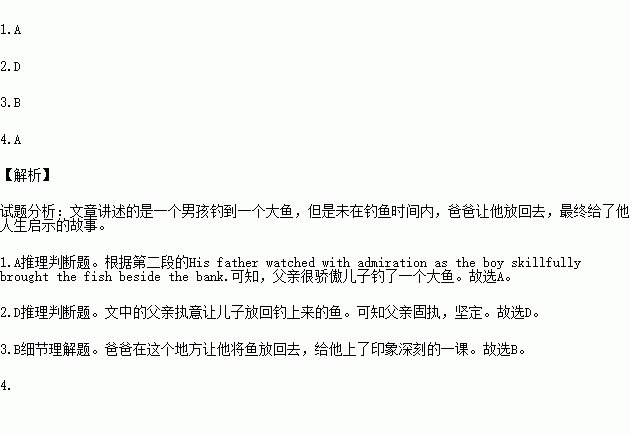题目内容
There was once an 11-year-old boy who went fishing every time he went to an island in the middle of a New Hampshire lake.
On the day before bass (巴斯鱼) season opened, he and his father were fishing early in the evening, catching other fish with worms. Then he tied on a small silver lure(鱼饵) and put it into the lake. Suddenly the boy felt something very big pulling on the lure. His father watched with admiration as the boy skillfully brought the fish beside the bank. Finally he lifted the tired fish from the water. It was the largest one he had ever seen, but it was a bass.
The boy and his father looked at the big fish. The father lit a match and looked at his watch. It was 10 pm — two hours before the season opened. He looked at the fish, then at the boy. “You’ll have to put it back, son,” he said.
“Dad!” cried the boy. “There will be other fish,” said his father. “Not as big as this one,” cried the boy. He looked around the lake. No other fishermen or boats could be seen in the moonlight. He looked again at his father.
Even though no one had seen them, nor could anyone ever know what time he had caught the fish, the boy could tell from his father’s voice that the decision couldn’t be changed. He threw the huge bass into the black water.
The big fish disappeared. The boy thought that he would never again see such a big fish.
That was 34 years ago. Today the boy is a successful architect in New York City. He often takes his own son and daughters to fish at the same place.
And he was right. He has never again caught such a large fish as the one he got that night long ago. But he does see that same fish ... again and again ... every time he has an ethical (道德的) decision to make. For, as his father had taught him, ethics are simple matters of right and wrong. It is only the practice of ethics that is difficult.
1.How did the father feel when he saw his son skillfully pulling a big fish out of the water?
A. Proud. B. Nervous.
C. Curious. D. Shocked.
2.From the text we know that ______.
A. the father didn’t love his son
B. the father always disagreed with his son
C. the father disliked the huge fish
D. the father was firm and stubborn
3.The successful architect went fishing with his children at the same place because ______.
A. they might catch a big fish there
B. he remembered the moral lesson from his father
C. he wanted to remember his father
D. their children enjoyed fishing there
4.What does the author want to show in the story?
A. It is easy to say something, but difficult to do.
B. An ethical decision is not difficult to make.
C. It is hard to tell right from wrong sometimes.
D. Fishing helps you to make right ethical decisions.

